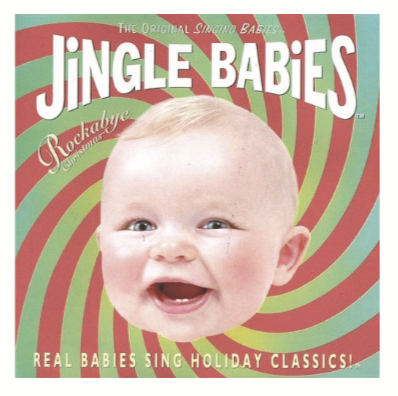Is holiday spirit in our blood? It must be, seeing as how I can’t think of any other music—except perhaps for nursery rhymes—as deeply known by everyone from mass murderers to grandmothers. Why, then, do Christmas carols make us ache? Why do I cringe each year in early November when I find myself singing along in Crate & Barrel with in-store overhead renditions of whatever current recording artist has reinterpreted “Jingle Bells”? Sometimes I catch myself humming “White Christmas” in July, unconscious, giddy. I’m always told to shush.
Rockabye Christmas is a holiday tribute record consisting of twelve Christmas favorites presented via the sound of screaming infants (a.k.a. the Jingle Babies). The album art features an enormous disembodied baby head, its small blue eyes flecked with gleam, its two-toothed mouth gaping. The head is set on at the center of an LSD swirl, a swirl colored not in theme with the seasonal red and green, but just off—orange and aqua. Tacky font arranged around the unblinking baby declares this album “The Original Singing Babies,” sold with the slogan “Real Babies Sing Holiday Classics!”
On the opening, “Silent Night,” the babies’ various calls are arranged and rendered over MIDI-sampled strings, woodwinds, and various other goo-goo cacophony: birdcalls, musicboxes, some kind of psychedelic harp. Mostly, though, the music is just a minimal backdrop for the carefully collaged voices of the babies themselves. Many of the babies sound very sad and sob in a way that reminds me of rubber duckies squeezed in soapy water, while others coo in delight or bubble spittle. Sometimes they sneeze, or whisper “Mommy.” Sometimes they almost actually sing.
A man named Mike Spalla spent many hours in a small room arranging babble into melodies that, like some sort of Christmas miracle, actually resemble songs we’ve spent years trying to ignore. His label, Jingle Cats Music, has also released several other Xmas mashups, including Jingle Cats Meowy Christmas, Here Comes Santa Claws, and Jingle Dogs Christmas Unleashed. There’s even a Jingle Cats role-playing videogame known as Jingle Cats: Aito Yujono Neko Monogatari, Love Para Daisakusen, in which the object is to breed and care for cats, which begin to sing when they’re done copulating.
The Jingle Babies’ effect, though, is monumental. Put this record on at a Christmas party and watch the way it takes control: everyone shuts up. They’re all looking off to nowhere, heads cocked, paying very close attention. They look amused, confused, offended. Someone will invariably say “Aww” or “That’s cute,” but by the middle of the second song, people will tackle you to reach the stereo. They will take you by...
You have reached your article limit
Sign up for a digital subscription and continue reading all new issues, plus our entire archives, for just $1.50/month.
Already a subscriber? Sign in





